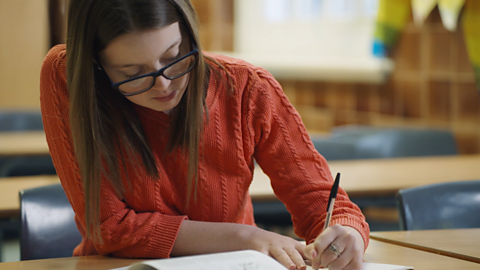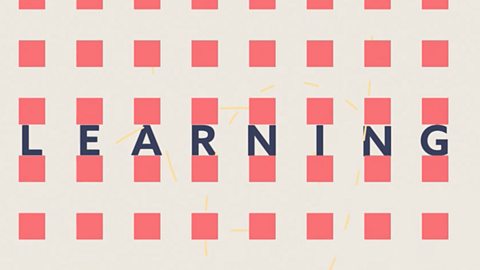This article was first published on 9 January 2020.
Let's face it, getting organised can be pretty overwhelming. So what can you do to get started?
Radio 1's Life Hacks presenter, Katie Thistleton, met up with uni student vlogger, Jack Edwards, to find out how he's managed to get himself organised despite feeling like he's far from a natural!
Jack
You don't have to be a naturally organised and super efficient person to be productive and make things work for you.
Katie
Hello, I'm Katie Thistleton from BBC Radio 1's Life Hacks and I'm here with Jack Edwards, YouTuber extraordinaire.
Jack
Wow, that was very generous!
Katie
No, you are! Now you have an account, which is all about your life at university and something you talk about quite a lot is organisation. Now that is a skill you need no matter what stage of life you're at – whether you're in school, whether you're in college, uni or in the working world. Why is being organised so important?
Jack
To me, it's because I'm so disorganised. I'm all over the shop, so for me it's very much about managing that and working out what actually is working for me, how I can be efficient and how I can actually get things done.
One thing that I absolutely swear by is having a to-do list and I had to-do lists for such a long time where there would always be something that I wasn't ticking off or I'd always feel like 'oh, I haven't quite achieved everything on there.' So I started making to-do lists, which I call to-dos list with a hierarchy of priorities. So you have almost three sections – one is 'urgent', one is 'do soon', one is 'when I get time'.
Katie
This is definitely the case with me – the stuff at the bottom of the list that isn’t urgent just never gets done.
Jack
Yeah and that's almost the point is that it stays there and then, once something is moved from 'do soon' or 'urgent', something else can move up and fill that space and so, naturally, something like do your laundry – at one point it's sort of like 'oh, I'll do that when I get time' and then you've got no pants left and you're like 'that is now urgent'. So I think naturally things do sort of build up a little bit and become more of a priority.
I like to write down deadlines and things on Post-it notes and stick them up around, you know, spaces that I use all the time, like the kitchen or my bedroom or things like that so that you’re sort of reminded, maybe I could use this time that I've got right now to get going with it.
I find it quite hard to break things down into smaller chunks – I like to sort of do a task all in one go. But, actually, it can be really, really useful if you do have an odd bit of time here or an odd bit of time there, then you can sort of slot things in and you actually don't realise how much you can do in an hour.
Katie
Have you got any advice for somebody who's like 'do you know what, I'm just naturally not an organised person but I need to be for my studies’ or whatever – how can they help themselves?
Jack
So I think it's definitely about working out what works for you and what makes you as efficient and productive as possible. So, for me, I do like to do things a bit last minute and I need a bit of pressure and sometimes I do like to do things all in one go and, because I understand that, I don't beat myself up over it. You know, if something is due in tomorrow, I think 'that's fine' because I've done it before, I can do it now. You know you're going to get it done and you understand your own way of working. That is productive still.
One thing I would say is work smart, not hard. So I think you don't always need to be labouring over a textbook for hours and hours and hours when maybe making flashcards for 15 minutes will make things sit in your brain a little better. Rather than just counting down the hours and thinking 'ok, I've been in the library for eight hours, therefore I will pass this module.' Some people will spend an hour doing really efficient work and do just as well.
Katie
Yeah, I like that. I like any excuse to work for an hour and not for eight hours. That sounds good to me.
Jack
Yeah, take it.
You don't have to be a naturally organised and super efficient person to be productive - Jack
Five top tips from Jack
1. The power of the to-do list
To-do lists are handy but it can feel a bit overwhelming seeing all your tasks written in one place. Try breaking the tasks on your list into three sections: 'urgent', 'do soon' and 'when I get time' to help you prioritise what's most important.
2. The value of reminders
With the best will in the world, it's still easy to forget things you need to do! Putting up sticky notes in places you go regularly (like the kitchen or your bedroom) can be a great way to remind yourself what's next on your to-do list.
3. Every minute matters!
It can be tempting to try to tackle a task all in one go and get it ticked off your list. Sometimes though, breaking jobs down into smaller chunks means you can get started on them when you have shorter windows of time.
4. Know what works for you
Maybe you're a planner who likes to start projects really early or maybe you need the adrenalin of a fast-approaching deadline to get you really focused. Try to suss out what works best for you to help you shape how you approach things.
5. Make efficiency your friend
It's not about how long you work on something but how productive that time is. You may find that spending 15 minutes making flashcards helps you remember information better than eight hours spent reading a textbook. Again, it's all about figuring out what works for you and running with it!

Revision: How to get organised
Advice on how to get organised with your revision.

Self-care and self-confidence
Life can be stressful, so we’ve asked our coaches for their advice on how to keep upbeat.

The key to learning more effectively
David Didau talks about how learning works.
